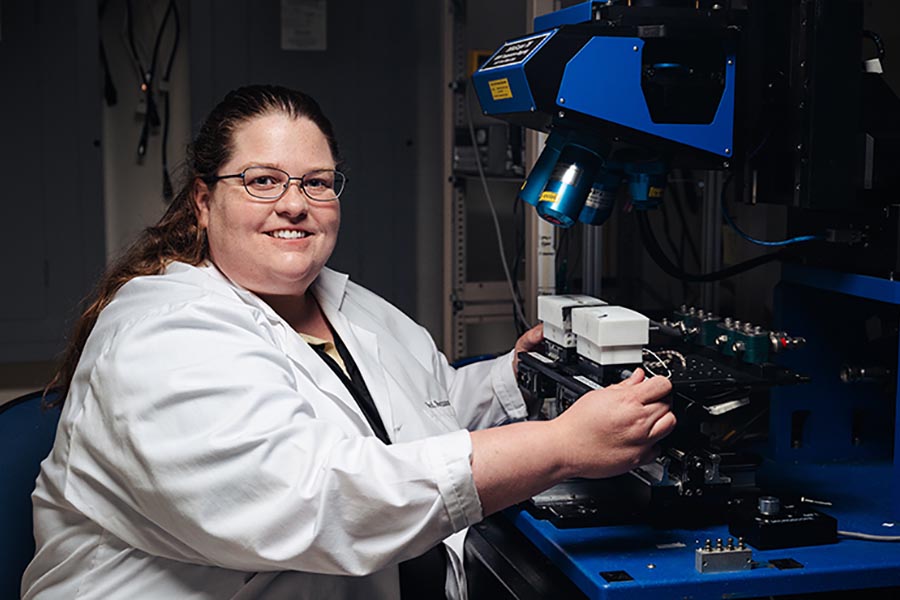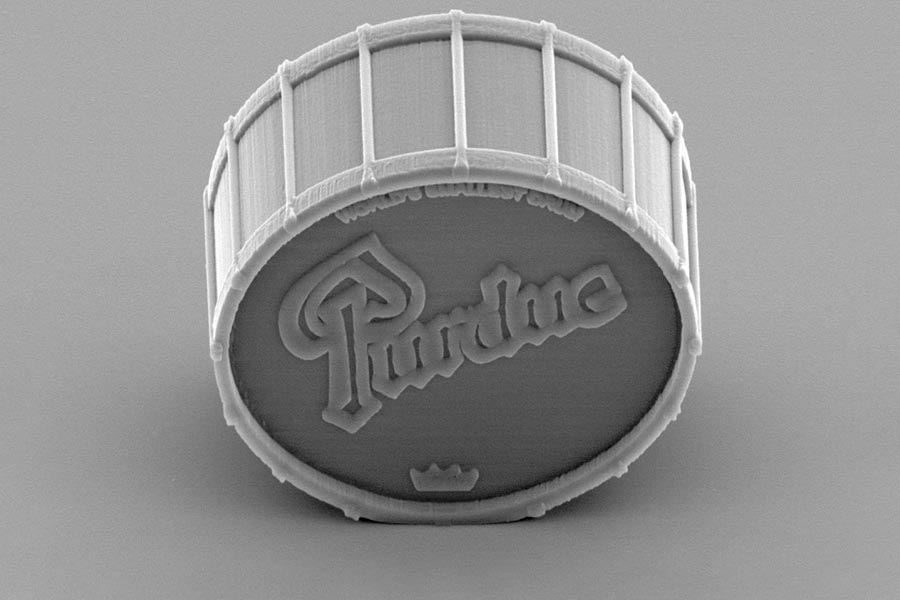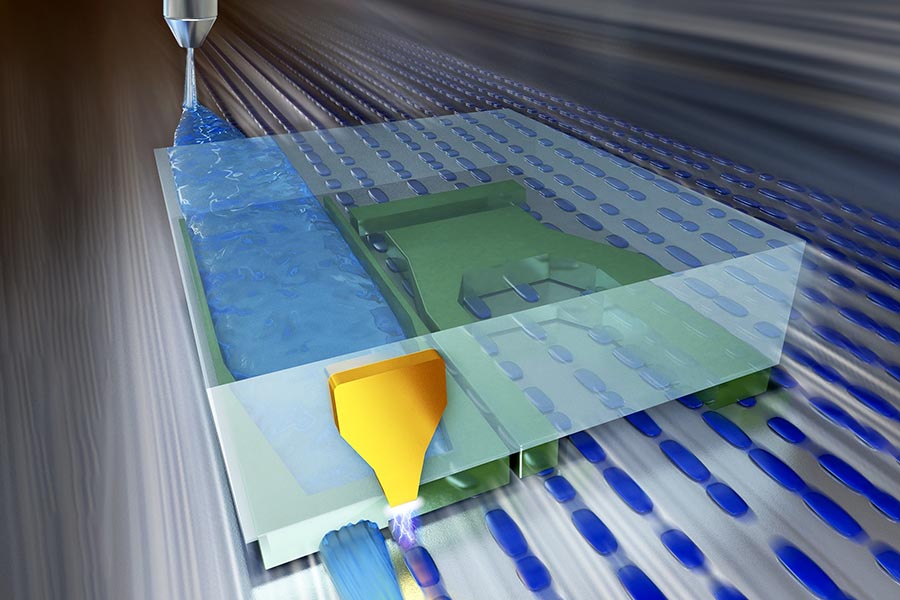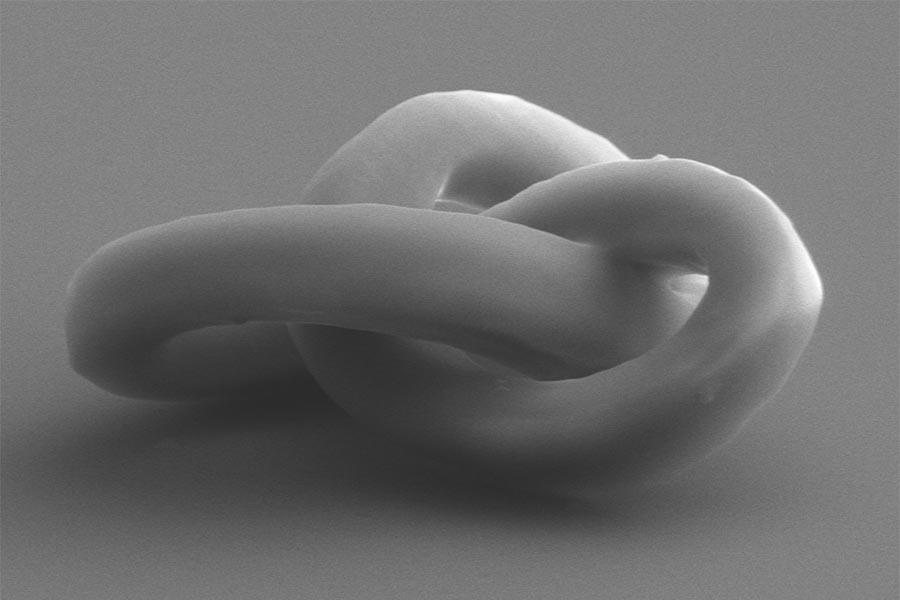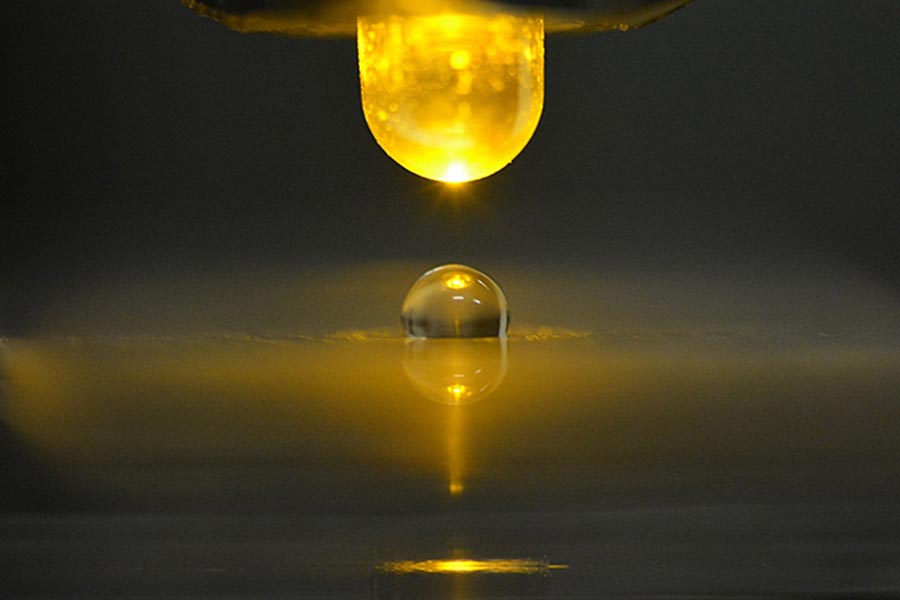Micro and Nanotechnology
There’s a big future in small things. Nanotechnology is the new frontier of engineering, imagining new possibilities in manufacturing, fluid mechanics, robotics, combustion, biomedicine, measurements, heat transfer, and more. Purdue hosts the largest academic cleanroom in the world, the Birck Nanotechnology Center , where interdisciplinary teams have access to the absolute cutting-edge of nano-scale characterization (microscopy and measurements) and fabrication (deposition, etching, lithography, etc.) With these tools, mechanical engineers conduct world-class research in:
Nanoscale manufacturing
Micro- and nano-fluidics
Biomolecular detection
Nanoscale thermal transport
Computational modeling
Nanomechanical materials
Faculty in Micro & Nanotechnology
Fluid dynamics
Biomaterial
Multiphase flows
Non-Newtonian fluid dynamics
Microfluidics
Complex fluids
Soft matter
Modeling of nonlinear systems
Structural dynamics and localization
Flow-induced vibrations
Impacting systems
Bifurcations and chaos
Renewable Energy Materials (physics-based energy yield predictions, sustainable PV and energy storage materials, recycling)
Electro-Optical-Thermo-Mechanical Reliability (in-situ and in-operando accelerated stress tests)
Heterogeneous Integration & Advanced Packaging (sub-10 μm pitch interconnects, low-loss interposers)
Harsh Environment Electronics Integration (high temperature Pb-free solders and nano-thermal interfaces)
Thermal Physics ... Heat Moving Energy
Spectroscopy ... "Seeing" energy with light
Nanophotonics ... Pushing light to see more
2D Materials ... Creating functionality by losing dimension
Modeling and experimental studies on processing
Structure property relationships in polymer films and moldings and polymer/metal/ceramic hybrid systems
Multi-scale robotic manipulation and assembly
Mobile micro/nano robotics
Micro/nano aerial vehicles
Micro-Bio robotics
Mechatronics
MEMS/NEMS
Automation for the life sciences
Dynamic systems and control
Mechatronics
Digital and functional printing and fabrication
Motion and vibration control and perception
Embedded systems and real-time control
Advanced materials
Bioinspired design and manufacturing
Nanomachines
Bio-inspired and mechanically adaptive electronics
Multimaterial additive fabrication
Soft actuators (artificial muscles)
Wearable actuators (haptics)
Polymer design and polymer physics
Deformation sensors and transistors
Soft hydraulics
Fluid dynamics
Non-Newtonian fluid mechanics
Particulate and multiphase processes
Computational and data-enabled science & engineering
Scientific machine learning
Nonlinear waves
Composites materials design and manufacturing
Sustainable and recyclable-by-design polymers and composites
Polymer processing and characterization
Composites recycling
Hybrid manufacturing systems
Multiscale modeling
Damage mechanics
Laser absorption spectroscopy diagnostics for gas temperature, pressure, velocity, and chemical species
Laser-induced fluorescence and photophysics
Non-equilibrium gases and reaction kinetics
Hypersonic flows, shock waves, and detonation waves
Combustion and propulsion
Predictive, multi-scale modeling and simulation of microstructure evolution in confined granular systems, with an emphasis in manufacturing processes and the relationship between product fabrication and performance.
Application areas of interest include:
(i) particulate products and processes (e.g., flow, mixing, segregation, consolidation, and compaction of powders),
(ii) continuous manufacturing (e.g., Quality by Design, model predictive control, and reduced order models), and
(iii) performance of pharmaceutical solid products (e.g., tensile strength, stiffness, swelling and disintegration), biomaterials (e.g., transport and feeding of corn stover) and energetic materials (e.g., deformation and heat generation under quasi-static, near-resonant and impact conditions, and formation and growth of hot spots) materials.
Sustainable energy and environment
Combustion and turbulent reacting flows
Combustion and heat transfer in materials
Biomedical flows and heat transfer
Global policy research
Advanced multi-scale manufacturing
Ultrafast laser machining and processing
Fiber optic sensors and environmental monitoring
Spray-based nanoparticle coating and additive manufacturing
Machining of carbon fiber reinforced polymer (CFRP) composites
Computational solid mechanics
Multiscale modeling of materials
Finite Elements
Dislocation dynamics
Reliability of electronic interconnects
Shock compression in solids
Phase transformations
Energetic materials
Wearable biomedical devices
'Crack’-driven transfer printing technology
Scalable manufacturing technology
Mechanics and materials for flexible/stretchable electronics
Optical tweezers and optical manipulation
Nanophotonics
Photothermal conversion and applications
Optical and optoelectronic materials
Nanoscale energy transfer
Laser processing and diagnosis
Acoustic tweezers
Acoustofluidics
Acoustic metamaterials
Ultrasound control
Underwater communication
Ultrasound imaging
Multiphysics wave propagation theory
Noise control and energy harvesting
Naturally nanostructured materials
Energy, water, and wearable technology
Manufacturing
Bio-inspired designs
Surface engineering and multifunctional materials
Convergent Manufacturing for Industry 5.0: hybrid manufacturing processes, heterogeneous materials, and bio-inspired designs
Systems integration, productization, and production
Heavy-duty machines: machining, lubrication, and corrosion
Heterogeneous and hierarchical integration (mechanical-electrical-optical and nano-micro-meso-macro)
Precision agricultural and food: cellular agriculture, vertical farming, micro-production, and resilience
Frugal engineering, social innovations, and social equity
Manufacturing in space
Transport Phenomena in Multi-Scale, Heterogeneous Materials & Systems
Fundamentals of Nanoscale Thermal Transport
Heat Transfer in Natural and Synthetic Fiber Systems
Thermofluids Interactions
Multi-Physics Metrology Design
Electronics Cooling and Thermal Management
Energy storage and conversion (batteries, fuel cells)
Mesoscale physics and stochastics
Reactive transport, materials, processing, and microstructure interactions
Scalable nanomanufacturing: lithography and imaging
Optical and magnetic data storage
Nanoscale energy conversion, transfer and storage for alternative energy
Mechanobiology and biomechanics
Diagnostics
Bacterial biophysics
Micro/nano fluidics and transport
Biotechnology development
Physicochemical hydrodynamics
Measurement tools
Biomedical devices and wearables
Simulations of nanoscale thermal transport
Machine learning, optimization, and high throughput design
Thermal management in electronics, space, and battery applications
Transport phenomena in additive manufacturing
Nanomaterials and devices for sustainable energy
Contact mechanics
Stresses, fatigue and friction of rolling/sliding
Micro-mechanics of boundary and mixed lubrication regimes
Spall initiation and propagation
Surface science and damage
Dynamics of ball and rolling element bearings and rotating systems
Friction induced vibration and squeal in dry contacts
Friction and wear of dry and lubricated contacts
Virtual tribology
Dry and lubricated fretting wear
MEMS for in-situ monitoring of tribological contacts
Discrete element modeling
Design
MEMS, nanotechnology
BioMEMS
Biosensors
Protein detection
Aptamers (Nucleic-acid-based receptor molecules)
Laser additive manufacturing
Ultrafast laser matter interaction
Laser welding
Laser assisted machining
Laser shock peening
Multi-physics, multi-scale modeling
Micro-nano manufacturing
Multiphase combustion, particularly related to propellants, explosives, and pyrotechnics
Nanoscale composite energetic materials
Advanced energetic materials
Microscale combustion
Computational and experimental solid mechanics focused on fatigue, fracture, and multi-physics phase evolution problems
Computational techniques including Finite Element Analysis (FEA), Isogeometric Analysis (IGA), geometric modeling, CAD and optimal design
Heterogeneous Integration and Advanced Electronics Packaging with a focus on thermomechanical behavior, reliability, and electrical-thermal-mechanical co-design
Measurement science and instrumentation
Particle image velocimetry
Quantification of uncertainty
Multi-phase flows
Flow induced vibrations and hydro-kinetic energy
Biological flows
Biofluid mechanics
Biomedical cardiovascular devices
Heart failure and diastolic dysfunction
Scanning Probe Microscopy
Metrology
Optomechanics
Mass spectrometry
Contact mechanics
Desalination & Water Treatment
Water-Food-Energy Nexus
Thermofluids
Nanotechnology
Membrane Science
Discrete element method (DEM) modeling for particulate systems
-- model development, e.g., fibrous particles, particle breakage, particle shapes
-- application to manufacturing, e.g., storage and flow, blending, segregation, drying, coating, wet granulation
Finite element method (FEM) modeling of powder compaction
-- e.g., roll compaction, tableting, picking and sticking
Multi-scale modeling (FEM combined with DEM) of powder dynamics
-- model development and application to hopper flow, blending, and segregation
Advanced electronics cooling and packaging technologies
Phase-change transport phenomena
Additive manufacturing of thermal management components
Topological optimization and machine-learning-based design
Thermal systems analysis for electrification and energy efficiency
Microscale and nanoscale surface engineering for enhanced thermal transport
Laser-matter interactions
Laser-induced plasma and laser-plasma interaction
Laser applications in manufacturing, materials processing, and other areas
Nanoscale energy transport
Nano-optics and laser-based nano-optical engineering
Image-based computational and experimental fluid dynamics for porous-media and biomedical flows
Translational research integrating high-performance CFD, image-based and physics-informed machine-learning, and uncertainty quantification to address unmet clinical needs
GPU-parallelized lattice Boltzmann method for DNS and LES of turbulence
Micro-bubble coalescence and detachment in microfluidics
Biomanufacturing and biopreservation
Microfluidics
Biotransport
Micro/nano biomedical devices
Diagnostics
Multiscale superfast 3D optical sensing
Biophotonic imaging
Optical metrology
Machine/computer vision
3D video telepresence
3D video processing
Virtual reality
Human computer interaction
Deformation, stress, plasticity, fracture
Multiscale modeling, first-principles, molecular dynamics simulations, and finite element modeling
In-situ experiments
Mechanics of redox active materials - Li-ion batteries, Na-ion batteries, all-solid-state batteries
Mechanics of polymeric materials - organic electrochromics, superelastic organic semiconductors
Lithium-ion batteries
Solid-state batteries
In situ and operando characterization
Modeling, simulation, and optimization of battery systems
Micro/nano fabrication
Micro/nano fluidics
I want to research in
I want to have an impact in...


